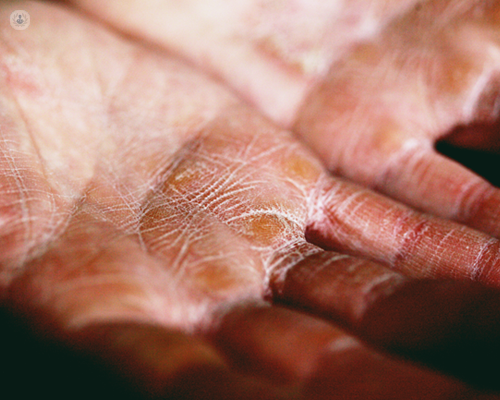Managing eczema
Escrito por:Eczema is a dermatological condition that comes and goes, and when it comes it can have a significant impact on patient quality of life.
Top Doctors speaks to highly-respected consultant dermatologist Dr Zeeshaan-Ul Hasan about how to manage eczema flareups in this comprehensive, easy-to-follow article.

What can trigger the recurrence of eczema?
Eczema, commonly referred to as atopic dermatitis, is a chronic skin disorder that has a tendency to reappear for a number of reasons. Typical causes include:
Irritants such as exposure to soaps, detergents, chemicals, or certain materials or substances.
Allergens
Things such as pollen, pet hair/skin, mould, and certain foods can cause allergic responses that worsen eczema.
Weather
Hot and humid circumstances, as well as dry, chilly weather, can make eczema symptoms worse.
Stress
Sometimes stress can make someone’s eczema symptoms worse.
Hormonal changes
Hormonal fluctuations, especially in women, can influence eczema flare-ups.
Infections
They can trigger eczema and these can be worse in those with a compromised immune system.
When is treatment for eczema required?
Eczema treatment becomes necessary when people have a flare of their eczema symptoms. Symptoms can include; their skin becoming dry, itchy, flaky, cracked or fissured.
Mild instances of eczema can often be treated with over-the-counter medications and lifestyle adjustments. However, in moderate to severe cases, medical intervention may be required to relieve symptoms and prevent complications.
What is the best way to treat eczema?
The best way to treat eczema involves a combination of approaches and depends on the severity of symptoms. Some of the approaches that can be used include:
Moisturisation
Replacing the natural oils in the skin which are lost with fragrance-free moisturisers helps to reduce dryness and itchiness.
Topical corticosteroids
These anti-inflammatory creams or ointments are commonly used to settle down an overactive immune system.
Topical calcineurin inhibitors
These non-steroidal anti-inflammatory creams or ointments that can be used on sensitive areas, such as the face, genitals and hands.
Antihistamines
These can help reduce itching and improve sleep.
Avoiding triggers
Identifying and avoiding triggers that worsen eczema can help prevent flare-ups.
Wet dressings or bandages
These can be used for more severe flare-ups to soothe and protect the skin
Phototherapy
Controlled exposure to ultraviolet light can help manage eczema symptoms in some cases.
In severe cases we can offer:
- Systemic medications such as Methotrexate or Ciclosporin - to help suppress the overact immune system from attacking the skin.
- Biologic medications - these are drugs that are designed to target specific parts of the immune system that are known to be drive the over activation of the immune system
- JAK inhibitors - a new class of drug taken in a tablet form which works similar to systemic drugs but shows better effectiveness in treating eczema
Can lifestyle changes help?
Lifestyle changes can play an important role in managing eczema:
- Avoid irritants: Use gentle and fragrance-free products for skincare and washing clothes
- Moisturising regularly: Replacing the lost oils in the skin to prevent dryness and itching.
- Identifying and avoiding triggers: If certain foods or environmental factors worsen eczema, try to avoid them.
- Stress management: Techniques like meditation, exercise, or counselling can help manage stress-related flare-ups.
Should you keep areas affected by eczema covered?
In general, covering the affected areas can provide some benefits by preventing excessive scratching and infection. Wearing breathable cotton clothing may be less irritating to the skin for certain people. However, striking a balance is critical, as excessive sweating or friction from clothing can aggravate eczema in some cases.
When should you see a specialist about eczema?
If your eczema symptoms persist despite over-the-counter medicines and following some of the advice listed above, or if the condition is interfering with your everyday life and/or sleep, you should consult a doctor.
Dermatologists are doctors that specialise in skin conditions and can provide a thorough evaluation and treatment plan. If there are any concerns about allergies or potential triggers, a dermatologist can discuss this with you and help decide what sort of allergy tests might be appropriate.
Find out how to manage your eczema symptoms, or other dermatology conditions, by arranging a consultation with Dr Hasan via his Top Doctors profile.



